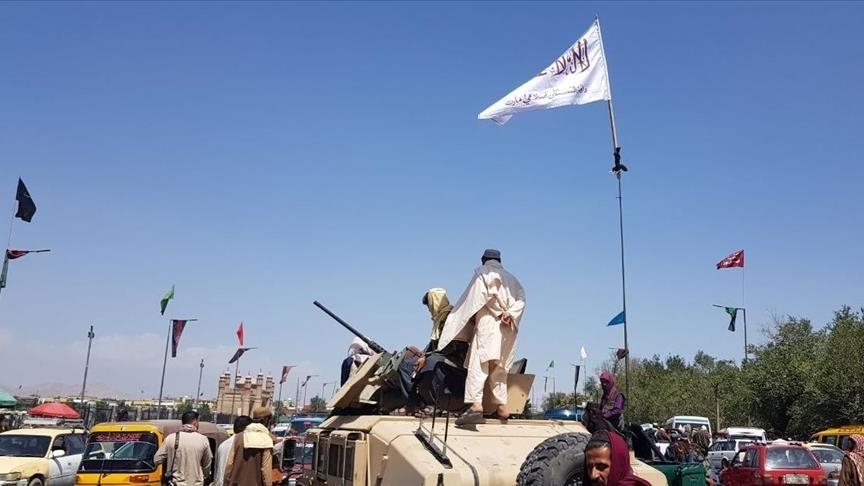20 years after invasion, it begins where it ended in Afghanistan
Almost everything US did after 2002 in Afghanistan was a mistake, say experts

KARACHI, Pakistan
On a chilly night of Oct. 7, 2001, the US forces invaded Afghanistan, aiming to eradicate the al-Qaeda terrorist network, capture its leader Osama bin Laden and oust the then-Taliban regime following the deadly Sept. 11 terrorist attacks.
The decisive airpower propelled Washington to achieve one of the two primary goals, toppling the Taliban government within weeks and installing a hand-picked regime in Kabul.
But it took the US forces a decade to hunt down and kill bin Laden in an operation in Pakistan’s northwestern garrison city of Abbottabad in May 2011.
However, the ouster of the Taliban regime and almost elimination of al-Qaeda could not inspire the US to leave Afghanistan, as it together with its allies had pivoted to a “nation-building” mission in the war-wracked country amid a revitalized Taliban insurgency.
Exactly after 20 years, the wheel of history has turned full circle with the dramatic takeover of Afghanistan by the Taliban in the face of crumbling resistance from the West-backed Ashraf Ghani regime.
In the end, the 180,000 Afghan National Defense and Security Forces, and a police force with 150,000 personnel, besides an air force and other security wings armed with technology and trained by the US and NATO, proved unequal to a motley Taliban force.
The capital Kabul, and their birthplace, Kandahar, from where the Taliban had to run off in disarray, are again in their hands, along with the untamable northern Panjshir valley as a bonus.
The two-decade-long conflict cost the US a gargantuan sum of $2.26 trillion, with $88 billion of it disbursed for training, equipping, and funding the Afghan military and the police forces that mostly surrendered even without firing a single shot.
It also claimed the lives of 2,442 US troops, whereas another 20,666 soldiers were wounded since 2001, according to the US Defense Department.
The conflict also killed 1,144 personnel from the 40-nation alliance NATO.
End of war carries mixed bag
A stunned Joe Biden administration, already under fire for a "hasty" pullout, is scrambling to tackle the new reality in the war-wracked country.
The end of the 20-year war carries a mixed bag of hits and misses for Washington, according to local and international analysts.
Terry McDermott, a US-based expert on Afghan affairs, observed that almost everything went wrong for Washington after the Taliban ouster from Kabul.
“Obviously, 9/11 was a big deal and a horrific attack that deserved a sharp response. The US provided that response by ousting al-Qaeda and toppling its Taliban hosts. After that, almost everything the US did was wrong,” said McDermott, the author of two bestsellers, Perfect Soldiers: The Hijackers, Who They Were, What They Wanted, and The Hunt for KSM (Khalid Shaikh Mohammad).
Speaking to Anadolu Agency, the former Los Angeles Times national correspondent dubbed Washington's self-imposed nation-building task in Afghanistan as a total failure, saying: “The arrogance of thinking that America could rebuild Afghanistan in its own image was foolhardy.”
This, he went on to argue, was then compounded by not even concentrating on the task, but diverting resources to the 2003 Iraq War.
“Almost everything the US did after 2002 was a mistake,” he maintained.
Aizaz Ahmad Chaudhry, Pakistan's former foreign secretary in 2013-2017, observed that Washington did achieve its primary target by decimating the al-Qaeda network, but the shift of goal to nation-building made things complicated.
“The US did manage to decimate the al-Qaeda, thanks in no small measure to the cooperation from Pakistan. However, the shift of goal to nation-building, trying to impose a western model of democracy on Afghanistan, and seeking a military solution rather than a political settlement contain the lessons that the US needs to learn from,” Chaudhry, who also served as Pakistan's top diplomat in Washington, told Anadolu Agency.
Echoing a similar view, Salman Bashir, another former foreign secretary of Pakistan, said: “Net loss all around – for Afghanistan, the US, and the region as a whole.”
Bashir, who served as the foreign secretary in 2008-2012, told Anadolu Agency that the ill-planned US withdrawal from Afghanistan has posed a threat to the regional stability.
“Return of the Taliban after 20 years means it begins where it ended in Afghanistan,” he opined, adding that after spending trillions of dollars and losing precious human lives from all sides, "questions about regional stability remain and the post-US withdrawal politics and positions add to concerns about Afghanistan’s future.”
US still owes responsibility
Rejecting criticism of the Biden administration for the "hasty" pullout, McDermott said Washington had limited choices in the given circumstances.
“Biden was right to leave, because whenever the pullout occurred there was bound to be chaos in its wake,” he maintained.
Chaudhry, currently heading the Islamabad-based think tank the Institute of Strategic Studies, said Washington still owes a responsibility to the people of Afghanistan.
“The US has a responsibility towards the people of Afghanistan. Abandoning them after 20 years of military action is not an option,” he said, urging the US to “help avert a looming humanitarian crisis in Afghanistan.”
“Imposing economic coercion or freezing the funds that belong to the people of Afghanistan is not justice,” he went on to argue, referring to halting cash shipments and freezing Afghan assets by Washington after the Taliban takeover.
Islamabad, which is believed to have a degree of influence over the Taliban, has consistently been warning the international community of a "looming" humanitarian crisis in Afghanistan.
The country's army chief, Gen. Qamar Javed Bajwa, during a corps commanders meeting on Tuesday, expressed concern over the "brewing humanitarian and security situation" in Afghanistan, urging the international community to support Afghans at this trying time.
Anadolu Agency website contains only a portion of the news stories offered to subscribers in the AA News Broadcasting System (HAS), and in summarized form. Please contact us for subscription options.







